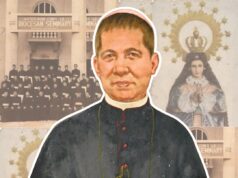The recent study made by Dr. Michael Tomasello and contained in his book “Why We Cooperate,” is interesting as it reveals a lot about those who filed their CoCs.
Dr. Tomasello, a developmental psychologist and co-director of the Max Planck Institute for Evolutionary Anthropology in Leipzig, Germany, designed and conducted an experiment, with the end in view of finding out what is it in human beings that move them to help others.
Dr. Tomasello divided his subjects into two: young children, on one hand, and chimpanzees, on the other.
Experimenting on the first group, he dropped a clothespin in front of a two-year-old child. He was surprised that, without any prompting, the child picked up the object. When an 18-month old infant saw an unrelated adult who wanted to go out of a door but could not because his hands were full, the child immediately helped to open the door.
He next conducted the same experiment on apes. What did Dr. Tomasello find out? Apes could also help, but choose not to.
Dr. Tomasello then concluded that being helpful in humans is not a learned behavior. The helping behavior, he argues, is innate because it appears so early, even before many parents could start teaching their children the rules of polite behavior. Simply put, man is born with a natural inclination to help, and the willingness to help others is not something imposed by parents or culture.
But here is the catch. As children grow older, they become more selective in their helpfulness. Starting around age 3, they will share more generously with a child who was previously nice to them. When they later become a part of a group, their almost reflexive desire to help — without expectation of reward — becomes shaped by the group. That’s when they learn either selflessness or selfishness.
Significantly, this study comes out at the heels of the fevered 2010 Election preparations in our country. If you watch 2010 wannabees on TV, the standard, almost hackneyed, sound bite you’ll hear is this: “Tumatakbo po ako dahil gusto kong makatulong sa ating mga kababayan.”
Although I am tempted to advise them to “tell that to the Marines,” a big part of me is still keeping its hopes high that the candidates’ avowed reason for seeking an elective post is really borne out of their innately genuine desire to help their constituents.
If they have a hidden agenda somewhere – whether to reclaim their old elective post, to amass more wealth, or whatever — then may God have mercy on their souls.
That is assuming, of course, that chimpanzees have souls.
Dr. Tomasello, a developmental psychologist and co-director of the Max Planck Institute for Evolutionary Anthropology in Leipzig, Germany, designed and conducted an experiment, with the end in view of finding out what is it in human beings that move them to help others.
Dr. Tomasello divided his subjects into two: young children, on one hand, and chimpanzees, on the other.
Experimenting on the first group, he dropped a clothespin in front of a two-year-old child. He was surprised that, without any prompting, the child picked up the object. When an 18-month old infant saw an unrelated adult who wanted to go out of a door but could not because his hands were full, the child immediately helped to open the door.
He next conducted the same experiment on apes. What did Dr. Tomasello find out? Apes could also help, but choose not to.
Dr. Tomasello then concluded that being helpful in humans is not a learned behavior. The helping behavior, he argues, is innate because it appears so early, even before many parents could start teaching their children the rules of polite behavior. Simply put, man is born with a natural inclination to help, and the willingness to help others is not something imposed by parents or culture.
But here is the catch. As children grow older, they become more selective in their helpfulness. Starting around age 3, they will share more generously with a child who was previously nice to them. When they later become a part of a group, their almost reflexive desire to help — without expectation of reward — becomes shaped by the group. That’s when they learn either selflessness or selfishness.
Significantly, this study comes out at the heels of the fevered 2010 Election preparations in our country. If you watch 2010 wannabees on TV, the standard, almost hackneyed, sound bite you’ll hear is this: “Tumatakbo po ako dahil gusto kong makatulong sa ating mga kababayan.”
Although I am tempted to advise them to “tell that to the Marines,” a big part of me is still keeping its hopes high that the candidates’ avowed reason for seeking an elective post is really borne out of their innately genuine desire to help their constituents.
If they have a hidden agenda somewhere – whether to reclaim their old elective post, to amass more wealth, or whatever — then may God have mercy on their souls.
That is assuming, of course, that chimpanzees have souls.




